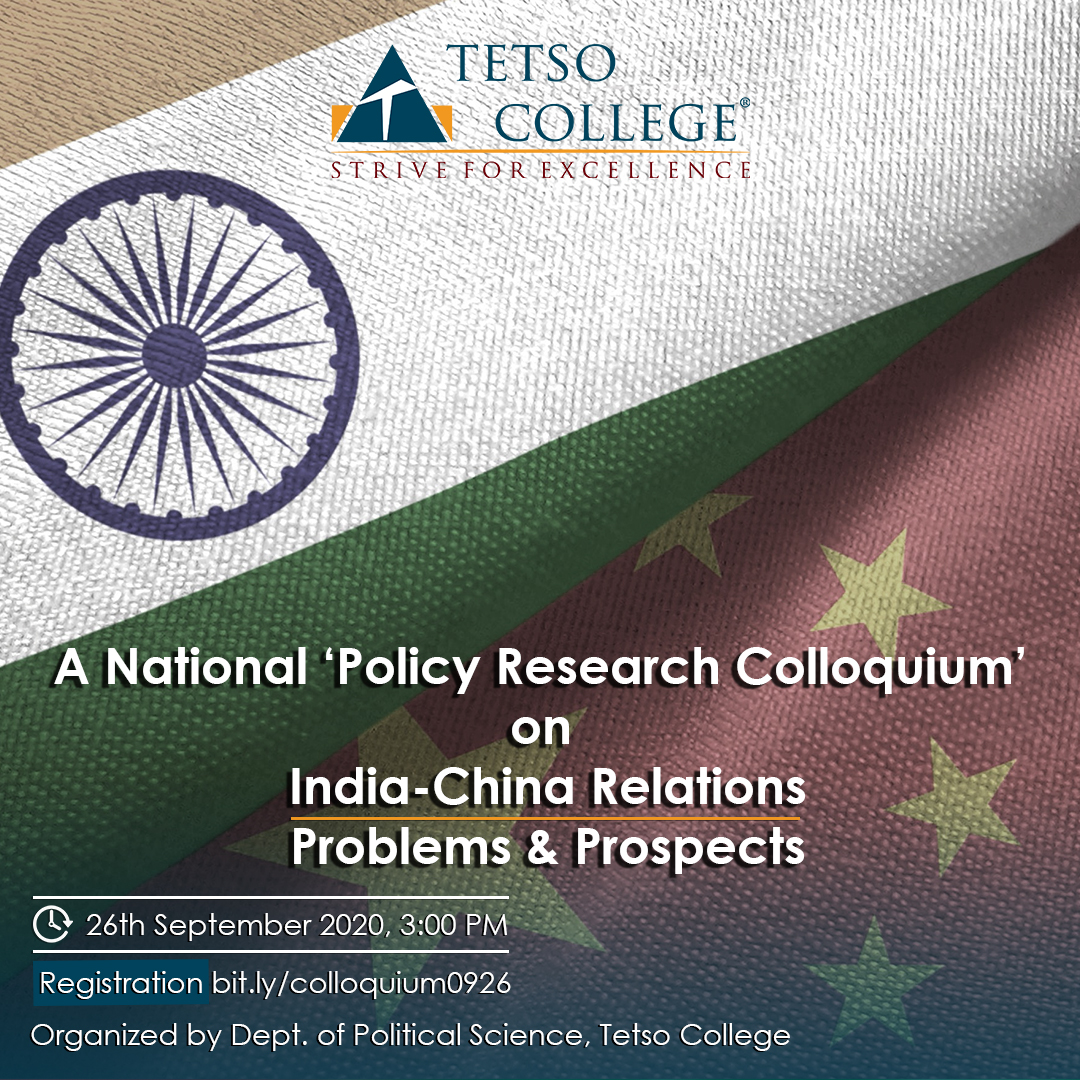A National
‘Policy Research Colloquium’
on
India-China Relations
Problems & Prospects
Organized by
Department of Political Science
Tetso College
Date : 26th September 2020
Time : 3:00 – 5:00 PM
Registration – bit.ly/colloquium0926

India – China Relations: Problems and Prospects
Concept Note:
India and China are ancient civilizations and their civilizational ties dates back to at least two millennia. Throughout the first millennium, both the civilizations are great spiritual and regional centers. After the origin of Buddhism
as a religion, its spiritual teachings flourished in India. Buddhism is state religion and venerated by great Emperors. Buddhism influenced art and architecture in the country. This spread across the frontiers into neighbouring kingdoms, empires taking its spiritualism, art and cultural values. China and India’s relations started with
Buddhism. Many scholars and philosophers visited from China to Indian courts participated in the Buddhist Councils and also became part of great universities of that time. Not only this, India and China have trade links through the Old Silk route and there were exchange of expensive commodities like tea, silk, etc. These trade routes served not only as economic interactions but also for spread of Buddhism into China and later into Far East South East China. Earlier literary works are also exchanged, translated into their own languages. After the establishment of British rule in India, the relation with its neighbours took a turn. Correspondingly, China also became a pawn
in the great game of power between western powers, Russia and Japan. The civilizational ties were halted. The game of buffer regions has started between great powers of the nineteenth century. Kingdoms like Afghanistan, Tibet,
Nepal, Myanmar, Bhutan Kashmir, and East Turkestan became tumultuous with constant geo-political activity. British Indian government had Pacts and Accords with most of these kingdoms. The long borders were demarcated.
Few of the border regions with ridges, lakes, narrow terrains were left by the British which became contending points in the twentieth and twenty first centuries. The movements for self-rule in Asia, Africa and Latin America that
begun decades earlier came to fulfillment after World War II. In other words, mid of twentieth century, many of the colonized countries were liberated from the fangs of Imperialism. India became independent in 1947 and China
became republic in 1949. Modern relations between the two countries had started in 1950. Beginning era of diplomatic ties started with recognition of People’s Republic of China on different platforms by India. Jawaharlal Nehru, the first Prime Minister of India is a statesman and one of the pioneers of India’s foreign policy. Thus India’s foreign policy is enriched by the principles of peaceful coexistence, non- interference and non-alignment. At the same time, Mao Tse- Tung, who is at the helm of affairs as head of the People’s Republic of China, viewed newly Independent countries as remnants of bourgeois nationalism. In spite of this, India and China had a friendship treaty famously known as ‘Panchsheel’. Panchsheel is basically a treaty inclusive to non-interference in Tibetan affairs by India. The slogan ‘Chini-Hindi Bhai Bhai’ turned into war cries against each other with invasion of Tibet by China, exile government of Dalai Lama and eruption of border skirmishes along the Mc Mohan line. This had blown into a full scale war in 1962 between both the countries as well as traumatic experience on Indian leadership. From then onwards, there are confidence building measures and high level state visits followed by increase in trade and cultural exchanges. But the recent skirmishes at borders, stapling of visas for Indian citizens from few frontier states, encroachments and blocking of LAC routes, military buildup and flexing in Ladakh, military talks deadlock in Ladakh, expansionist policies of both the growing economies are making the relations between India and China strained in each passing day. Keeping in mind different trajectories of the relationship in the dynamics of world politics, the presenters will throw some lights into the contemporary challenges faced by India and China through historical, economic, cultural and political analysis of their relations.









